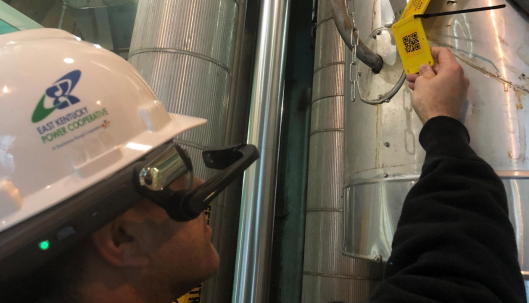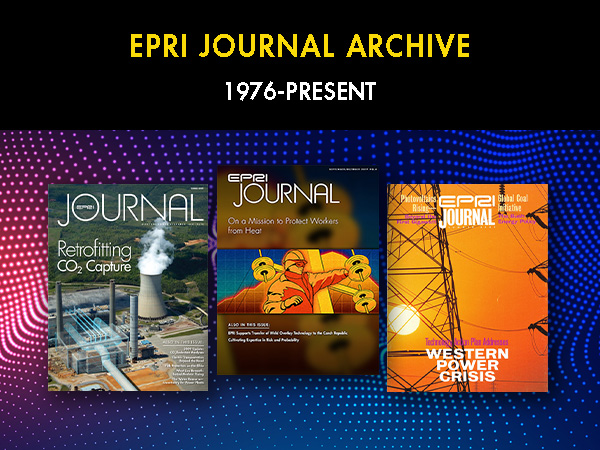A series of EPRI-facilitated webcasts enabled nearly 2,000 people from 122 utilities in 19 countries to share pandemic strategies and practices for power plant operations.
During the COVID-19 pandemic, some power plant operators purchased dishwasher-safe keyboards, mice, and other office accessories and provided employees with their own sets. Early in the pandemic when there were widespread shortages of hand sanitizers, several plants used their in-house chemical laboratories to manufacture their own sanitizers. These were just a few of the many creative pandemic strategies and practices that were shared among power plant operators across the globe during a series of EPRI-facilitated webcasts in March and April 2020.
Nearly 2,000 people from 122 different utilities in 19 countries attended six webcasts. Participants included plant managers, maintenance managers, health and safety personnel, and corporate staff. Plant operators presented on their experiences, lessons, and practices related to sequestering staff, cleaning, maintenance, deliveries, and much more. Participants asked questions and engaged in open discussion.
Common practices shared and discussed during the webcasts:
- Sequestering control room staff (particularly in high-impact states such as New York, New Jersey, and Michigan)
- “Locking down” plant control rooms so that only essential staff can enter
- Staggering shifts to reduce number of staff in facilities
- Screening people entering sites for potential infection using questionnaires and temperature tests
- Non-essential staff working from home
- Management staff working on rotation—some in the plant, some at home
- Deep cleanings of control rooms (such as disinfectant fogging)
- Setting up auxiliary control rooms where staff could work while fogging was performed in the main control room
“The overall picture from the webcasts is that power plant managers had solid plans in place and felt like they had a good path forward during the pandemic,” said Dwayne Coffey, an EPRI expert on the roles of people, processes, and technology in power generation. “They had a good basis to start from. Many plants already had staff sequestration plans for severe weather and simply modified them for longer periods.”
“The webcasts have proven invaluable for looking at best practices to manage COVID-19,” said Mark Field, who manages operations for an RWE power plant in the United Kingdom. “From each call, we were able to take learning points back for further discussion and development across our sites in the UK.”
Common challenges included obtaining cleaning supplies, personal protective equipment, and testing kits. Many plants delayed or deferred previously scheduled maintenance outages, in which up to 200 temporary workers converge on-site for 20-60 days to conduct work around the plant. Other operators moved forward with outages while screening workers upon entry and implementing social distancing.
Power plants had to alter their “lockout/tagout” safety procedures used to verify that potentially hazardous machines and power sources are properly turned off before maintenance can occur. Traditionally, operational and maintenance staff meet face-to-face for this process. Plants implemented various solutions, such as plexiglass screens, wearing masks, or staying at least six feet apart.
Digital Technologies to Enable Social Distancing
EPRI’s Coffey is examining the pandemic’s longer-term impacts on worker performance and culture in power plants. “Traditionally, staff are encouraged to have a questioning attitude, which often involves asking your colleagues questions and other face-to-face interactions,” he said. “How does this change in a pandemic and how do the changes impact plant safety and reliability?”
Digital worker technologies can potentially help. In late 2018, EPRI and power plant operators piloted a head-mounted, hands-free device that enables plant workers to discuss issues with remote experts. A computer with a micro-display on an articulated arm is attached to a standard hard hat (see photo). When the micro-display is positioned about one inch from the user’s eye, it has the appearance of a midsize tablet held at arm’s length. The device can be worn with safety glasses.
A plant worker wearing the device can video-chat with an expert while sharing his field of view. The expert can make annotations on the display and send documents, videos, and other information to assist the worker in operations and maintenance tasks. Augmented reality on the display enables the user to enter maintenance data and document completion of procedures.

EPRI successfully demonstrated all these capabilities at East Kentucky Power Cooperative’s John Sherman Cooper fossil plant. Another demonstration is underway at a biomass plant in Canada.
EPRI plans to examine additional digital approaches that can reduce face-to-face interaction during the pandemic. “How can you use virtual reality to train control room workers at home? How can you use mobile inventory queries and part ordering to reduce exposure for staff who work in equipment storerooms?” said Coffey. “These are the types of questions that we want to look at.”
EPRI’s Coffey continues to facilitate sharing of experiences and lessons among utilities, with the focus shifting to safely transitioning plant employees back to normal operations.
EPRI Leads Global Energy R&D for a Post-Pandemic Future
Virtually every energy company on the planet is wrestling with how to best meet customers’ energy needs during the pandemic and prepare for an uncertain future. This uncommon level of industry alignment presents a unique opportunity to benefit from EPRI collaboration.
EPRI has worked with thousands of utility staff with expertise in generation, transmission and distribution, the environment, and end-use customers to identify the need for and scope of four key research areas to address near- and long-term pandemic challenges:
- Building a more resilient and flexible grid
- Ensuring employee health and safety
- Meeting customers’ changing energy needs
- Creating a cleaner energy future
Key EPRI Technical Experts:
Dwayne Coffey
For more information, contact techexpert@eprijournal.com.

